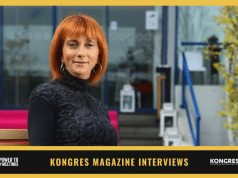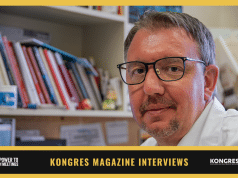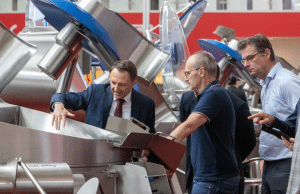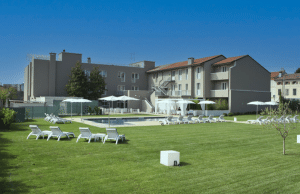How did your ideas for the eco-hotel, ski resort and other tourist ventures come about?
The ideas for new projects and investments came from my father. I jumped on the train in the idea and execution phase and tried to contribute a fresh approach to individual parts of the offer, service or the final product.
How important is the direction of the Slovenian meetings industry towards green meetings?
Slovenia is small. It’s so very small that the world doesn’t know it by name or by geographic location. This is a disadvantage, which can be turned into an advantage. If we know how to sell this exclusivity, non-commercialisation and easy access, we’ve got it. I think one of the key advantages of Slovenia is that you can cross it in a few hours and see plains, mountains, the sea and everything in between. Green meetings can take advantage of all of the above, without leaving visible negative consequences on the environment. It’s a win-win for everybody – meeting participants, organisers (also from a business point of view) and lastly for Slovenia, the environment the meetings take place in. As in many other areas the industry is what is drawing the crowds and, with a green approach, we can indirectly influence other individuals to become more environmentally conscious.
What are the advantages of your hotel in comparison to regular hotels?
I would stress that our complex has a complete offer in one place near the Triglav National Park – the heart of the Alpine valley and a wonderful starting point. We also have local, honest and motivated staff and, last but not least, offer the luxury of five stars in a modern, pleasant, sustainable hotel.
How are your business results impacted by the savings you generate through using green technologies and practices?
Especially in the area of energy we save a lot. In comparison to conventionally built hotels we use around 60% less energy. A guest creates over 10 times less CO2 emissions than in a regular hotel. Considering energy costs are the third highest expense, right behind wages and employee contributions, we save a lot of money. We can invest the surplus into a higher quality of food, staff education and so on, so our savings have multiple effects and positively influence all areas.
How do awards and certificates help you with your marketing?
The awards and certificates mainly help us establish our image and reputation. The reputation the hotel enjoys has positive effects on the clients’ decision. When they receive a number of offers, the awards and certificates help, but personal recommendations help the most. This often outweighs the price, since we are frequently the most expensive supplier. In marketing to individual guests, the awards and certificates that we have received are by and large less relevant.
Who is your main domestic and international competition?
I don’t wish to sound conceited, but we don’t have much competition in Slovenia, as our in-house offer is very rich and unique in many ways. Up until now we haven’t had a case where the decision-makers who came to do an inspection, experience our hospitality, level of service and spend the night went elsewhere or chose a different hotel in Slovenia. In a general sense, for those who choose only ‘on paper’, our competitors are two hotels in Portorož, one in Bled and two more in Ljubljana. All of them are in more developed tourist destinations with better support and promotion by the Slovenian Tourist Board.
The competition abroad is strong, but as far as we can follow, we mostly lose our potential business guests or international events to hotels further southeast, mostly because of lower prices.
How big is the carbon footprint of an average congress? How can it be decreased?
The footprint of an average event is hard to estimate, as there are a number of variables and individual events cannot be compared. For starters, the choice of the hotel is very important. In comparison to regular hotels our hotel creates over 10 times less CO2 emissions due to its construction. Transportation is also important. When our guests arrive by, for example, bike or train, they contribute greatly to the decrease of CO2 emissions. In the spirit of decreasing the carbon footprint other public transport also helps. Cars, for example, are the least environmentally friendly, yet sadly the most common means of transport. Other things largely promoted by the media are details, which nevertheless should not be overlooked, especially in the case of large events, where the sheer volume of people is the real issue. The choice of food and beverages, where they are transported from, how they are cultivated, made, what kind of devices are used etc. also plays a role. Everything contributes a part to the entire carbon footprint.
Environmentally conscious companies interested in making a difference can upgrade their services to infinity. Everything right up to the last coffee break can be optimised. For all of this to happen the desire needs to be mostly on the client’s side – we can’t force them to follow our sustainable ideas and advantages.
What are your green initiatives for the future?
We will continue to work on decreasing our impacts on the environment, namely by decreasing energy use and by adding new renewable energy sources etc. We will try to keep informing the public – our guests and others, since we have noticed the ones who visit us are the most susceptible to ecology and green measures. They often ask questions on their own initiative and want to implement changes or upgrades in their own homes. They get many ideas to improve their own homes from our hotel. We will continue to spread knowledge among high school and college students and organise open houses, lectures and other initiatives.
Do you think congress guests are sufficiently aware of sustainability? Does the government do enough about their levels of awareness?
There is a lot being written and talked about eco, green etc., but actions speak louder than words. There isn’t much to see yet. Unfortunately, until investors and decision-makers realise all of the advantages (including economic ones), green and sustainable practices will only be talked about, but not put into action. I am astonished by the slow progress in this area. Slovenia is no exception. In Slovenia we have written and talked about this a lot, but the effects are small and seen only in companies that understand and use the advantages.
What kind of development scenario do you foresee for Slovenian tourism?
I don’t feel competent or experienced enough to make deeper assessments of the global picture of Slovenian tourism. All I can say is the following (which is probably also true for other industries): we will have to move away from our ways and habits, we will need to cooperate and grow beyond our boundaries. First of all, we all have to sell Slovenia, after that the destination (not just Bled, Portorož and Ljubljana), and in the end the accommodation and other offers. Why? Because we are small but we all exist! And what we have is beautiful.
Do you adhere to the eco-philosophy in your private life as well?
Since I was a kid I was taught to conserve water, electricity and other things. Given my hobbies I spend a lot of time in nature, mostly in the mountains, so care for the environment is very important. As I spend a lot of time on the road I would also like to have an electric car, but I can’t afford it at the moment.
Are you a sports fan?
I’m not a sports fan, I only cheer for the winter season – that a lot of snow will fall and that it will be cold. And that the conditions to climb will be favourable.
Which music gives you an adrenaline rush?
Nothing specific, it depends on the situation. Sometimes it’s classical, sometimes electronic. It really depends on the song or the mood, I couldn’t really highlight only one song or only one genre, because I don’t have a special attachment to any.
Who are the people that have had the greatest influence on your personality?
Definitely my parents, I got a little something from both – I like to think the best of both. Later, I picked up a lot with wide eyes and large ears, silently in the corner, from smart and experienced people – friends, acquaintances, relatives … In a smaller measure I was also influenced by the environment I grew up in.
Which national culture and customs are closest to you?
I was never any good at culture or customs. I wasn’t even average, so it’s hard to be specific – I do like the proverbially punctual Swiss, exact and tidy Germans, talkative and panicky Italians and so on. Nothing specific, I like them all.
Simple people in remote places that I have visited during my alpinist expeditions around the world have made the biggest impression on me. When natives see tourists for the first time, they don’t know they are tourists. So they act real and emotional. They curiously admire your reactions and you theirs. Even though it’s a short time, you make incredible bonds with them when you are far from everything and you see how little you need to live. That’s when you see what unnecessary details we deal with in our everyday lives. And this doesn’t relate only to cultures or customs, nationalities or skin colour – this is what all of the people on Earth are like, we just have to give each other a chance.













